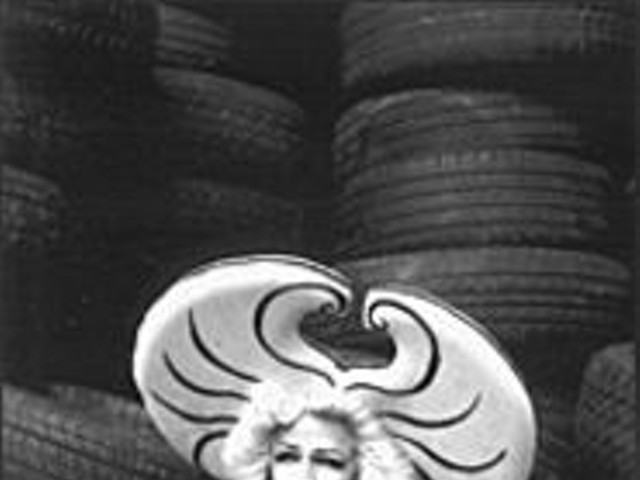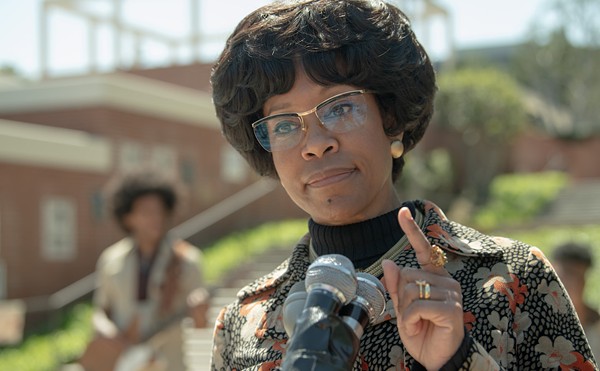In an era of assorted cinematic "special editions" (most often corrupted by superfluous fluff), the good news here is that Coppola and wunderkind editor Walter Murch have created the finest cut of their seminal movie that we're ever likely to experience. Since its initial release in 1979, Apocalypse Now has been a dark marvel, but years of ardent imitation (Full Metal Casualties of Platoon, etc.) have diminished some of its once-astonishing boldness. Wisely, Coppola and Murch have now fortified the film's incessant yangity-yang-yang bang-bang with some desperately needed yin. Perhaps the last two decades have allowed them to separate the massive struggle of their production from the plight of their characters, but whatever the reason, the movie now delivers both comfort and surprise, like some freakish old friend returning from a successful bout with rehab. It finally feels whole.
For those unfamiliar with the story, Apocalypse Now is about a very depressed captain with nice hair (Martin Sheen) who is dispatched into the jungle to assassinate an extremely depressed colonel with no hair (Marlon Brando) so that we can witness, from multiple angles, a curiously detached water buffalo being hacked to bits to the tune of the Doors' "The End." (The movie -- which initially ran without credits -- still conspicuously omits the standard claim that no animals were harmed during its making, but, then again, so could any production that uses conventional catering.) Along the noisy path of carnage, Carmine Coppola's spooky score and Mickey Hart's tribal thumpings, we meet an invincible white bastard (Robert Duvall) and watch as the two black leads (the stately Albert Hall and the jazzed-up, rocked-out Laurence Fishburne) die horribly along with countless generic locals. People bleed and sweat and yell a lot, and stuff explodes. That's the gist.
The reason the film succeeds despite these wearying elements is that Coppola has a knack for ironic juxtaposition, often teeming with absurdist overtones (in other words, he has a crush on Vonnegut). Note, for example, Duvall's simultaneous promotion of sadism and surfing as he extols the virtues of 6-foot waves while bodies pile up on the beach around him. Consider a peaceful family slaughtered over a measly puppy or the sudden appearance of Playboy models in the middle of the bloody jungle. The director's odyssey may not make a lot of narrative sense, but as a declamation of war it eschews boring macho valor, soaring instead with quirky works such as M*A*S*H and Slaughterhouse-Five while also feeling incredibly authentic. As the insanity permeates the youthful face of Sheen's antihero, Capt. Willard (whose hands even look young here), we have no choice but to share in both his shock and his transformation.
Despite Coppola's somewhat repetitive bows to David Lean -- bridges keep detonating as a very pricey form of set dressing -- it's pretty difficult to criticize the work on any technical level. Murch's sound mix is as virtuoso as Vittorio Storaro's luminous cinematography -- in tandem, as in the "Die Walküre" sequence or Dennis Hopper scatting through carnage, they're unearthly -- and Murch's new picture edit (from scratch, yet not unlike the original edit by Richard Marks) puts most choppy action fare to shame. Granted, it's preposterous to think that a loudspeaker could drown out several Hueys, but subjective weirdness is key to keeping the film's manly posturing at a reasonable level.
This Redux version offers loads of new material, enhancing everything from Duvall's manic obsession with Sam Bottoms' California surfer boy to Brando's snide criticism of U.S. policies. The most entrancing added sequences, however, have little to do with the business of soldiering or questing through depravity and decay. Coppola and Murch have balanced their new edit with grace notes of sweetness, elegance and eroticism, and the payoff is grand, providing both a reprieve from the multiple blitzkriegs and a break in the monotony of the cruise up the Nung.
One newly added segment features the Playboy playmates becoming vulnerable mortals, stranded in a trashed, monsoon-swept medevac base, with Willard and his men trading precious fuel for their favors. It's relevant and truly touching (and a showcase for Frederic Forrest's saucy saucier), bringing to the fore an urgent ache of hunger and naïveté within both the girls and the boys.
To balance out these crazy kids, we also have an amazing new sequence set in a misty, opulent French plantation. It's marvelous filmmaking -- august parlors lit with Parrish ochres -- with Willard falling under the seductive sway of a widow played by Aurore Clément while political debates and issues of territoriality storm about them. The adult sensuousness here is in itself adequate reason to check out Redux, but, as a point of contrast, it also enhances the olive drab and death reek with which the rest of the film is suffused.
Much like Brando's psychotic Col. Kurtz, a film director can be a deranged deity, bent on designing destinies. With Apocalypse Now Redux, it's a pleasure to report that Coppola has at last set right the world he created.





